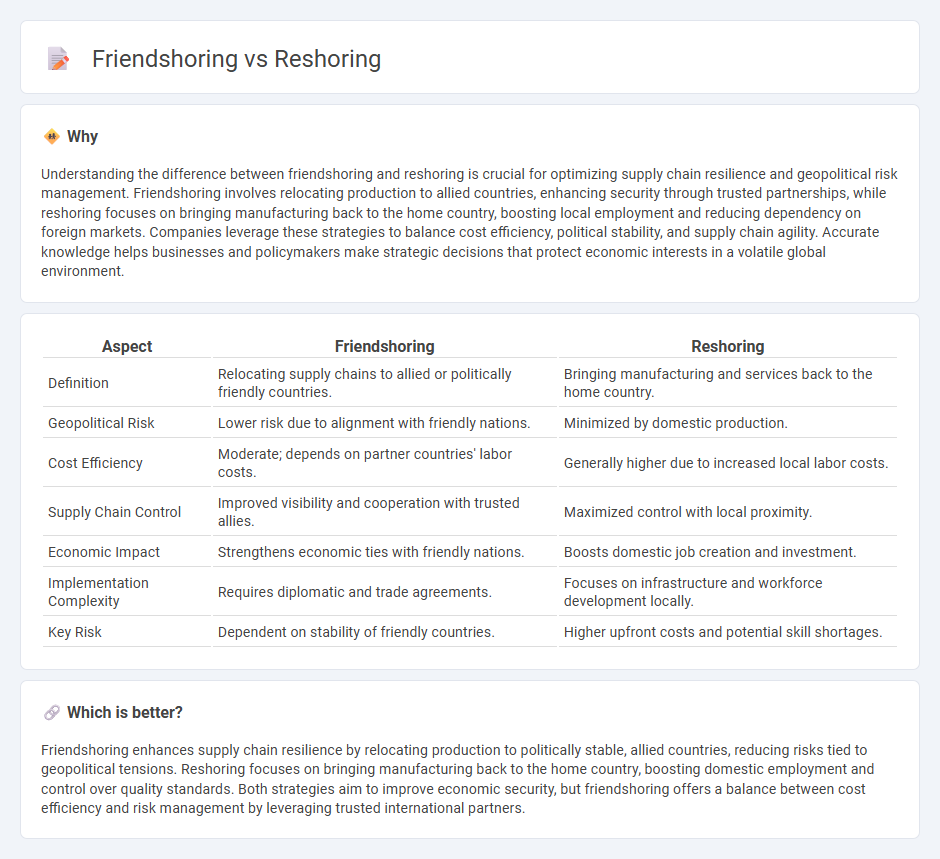
Friendshoring focuses on relocating supply chains to allied countries to enhance economic security and reduce geopolitical risks. Reshoring involves bringing manufacturing and production back to a company's home country to boost domestic employment and control. Explore the advantages and challenges of friendshoring versus reshoring to understand their impact on the global economy.
Why it is important
Understanding the difference between friendshoring and reshoring is crucial for optimizing supply chain resilience and geopolitical risk management. Friendshoring involves relocating production to allied countries, enhancing security through trusted partnerships, while reshoring focuses on bringing manufacturing back to the home country, boosting local employment and reducing dependency on foreign markets. Companies leverage these strategies to balance cost efficiency, political stability, and supply chain agility. Accurate knowledge helps businesses and policymakers make strategic decisions that protect economic interests in a volatile global environment.
Comparison Table
| Aspect | Friendshoring | Reshoring |
|---|---|---|
| Definition | Relocating supply chains to allied or politically friendly countries. | Bringing manufacturing and services back to the home country. |
| Geopolitical Risk | Lower risk due to alignment with friendly nations. | Minimized by domestic production. |
| Cost Efficiency | Moderate; depends on partner countries' labor costs. | Generally higher due to increased local labor costs. |
| Supply Chain Control | Improved visibility and cooperation with trusted allies. | Maximized control with local proximity. |
| Economic Impact | Strengthens economic ties with friendly nations. | Boosts domestic job creation and investment. |
| Implementation Complexity | Requires diplomatic and trade agreements. | Focuses on infrastructure and workforce development locally. |
| Key Risk | Dependent on stability of friendly countries. | Higher upfront costs and potential skill shortages. |
Which is better?
Friendshoring enhances supply chain resilience by relocating production to politically stable, allied countries, reducing risks tied to geopolitical tensions. Reshoring focuses on bringing manufacturing back to the home country, boosting domestic employment and control over quality standards. Both strategies aim to improve economic security, but friendshoring offers a balance between cost efficiency and risk management by leveraging trusted international partners.
Connection
Friendshoring and reshoring both aim to enhance economic resilience by relocating supply chains closer to home or to allied countries, reducing dependency on distant or unstable regions. These strategies support domestic manufacturing growth and safeguard critical industries by prioritizing trustworthy trade partners. Together, they help stabilize economies through diversified, secure, and regionally concentrated production networks.
Key Terms
Supply Chain
Reshoring involves relocating manufacturing and supply chain operations back to the company's home country to reduce risks associated with global disruptions and improve control over production quality. Friendshoring prioritizes moving supply chains to politically stable, allied nations to ensure reliability and mitigate geopolitical risks while maintaining cost efficiency. Explore the benefits and challenges of reshoring and friendshoring strategies to optimize your supply chain resilience and competitiveness.
Geopolitical Risk
Reshoring involves bringing manufacturing or services back to the company's home country to mitigate geopolitical risks such as trade wars and supply chain disruptions. Friendshoring shifts operations to politically stable and allied countries, reducing exposure to hostile policies while maintaining global diversification. Explore more about how these strategies impact global business resilience and competitive advantage.
Domestic Manufacturing
Reshoring emphasizes relocating manufacturing operations back to the company's home country to boost domestic production and reduce reliance on global supply chains. Friendshoring involves shifting production to allied nations with shared political and economic interests, ensuring safer and more reliable supply networks. Explore the benefits and strategic impacts of reshoring and friendshoring on domestic manufacturing to understand their influence on economic resilience.
Source and External Links
Reshoring - SCRG - Reshoring is the process of moving manufacturing operations from a foreign country back to a company's home country, often to regain control over quality, lead time, and supply chain visibility while reducing risks associated with overseas production.
What is Reshoring? Understanding Manufacturing Location Terms - Reshoring refers to the return of product manufacturing from an outsourced overseas location back to the country where the company is headquartered or its products are sold.
What is Reshoring? - Reshoring is the practice of bringing manufacturing and services back to the U.S. from overseas, aiming to strengthen the economy, create jobs, and reduce total product costs.
 dowidth.com
dowidth.com